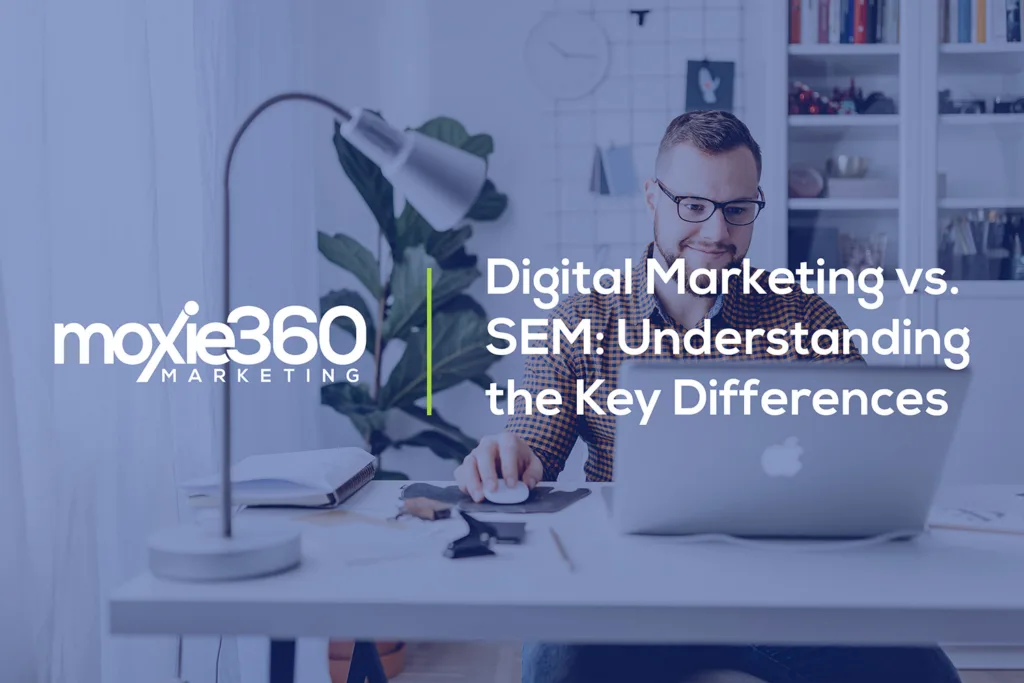In today’s digital age, understanding the various facets of online marketing is crucial for businesses looking to expand their reach and improve their bottom line. Two fundamental components often discussed are digital marketing and search engine marketing (SEM). While marketers sometimes use these terms interchangeably, they each represent distinct strategies with unique roles in a comprehensive marketing plan. Let’s dive into the differences between digital marketing and SEM and explore how each can benefit your business.
What is Digital Marketing?
Digital marketing encompasses all marketing efforts that use an electronic device or the internet. Businesses leverage digital channels such as search engines, social media, email, and their websites to connect with current and prospective customers. Here’s a breakdown of the primary components of digital marketing:
- Search Engine Optimization (SEO): Optimizing your website to rank higher in search engine results, thereby increasing organic traffic.
- Content Marketing: Creating and distributing valuable, relevant content to attract and engage an audience.
- Social Media Marketing: Using social media platforms to promote your brand and content.
- Pay-Per-Click (PPC) Advertising: Paying for ad clicks to drive traffic to your website.
- Affiliate Marketing: Earning a commission by promoting other people’s (or company’s) products.
- Email Marketing: Sending emails to prospects and customers to nurture relationships and promote products or services.
What is SEM?
Search Engine Marketing (SEM) is a subset of digital marketing focused specifically on increasing visibility in search engine results pages (SERPs) through paid advertising. SEM primarily involves:
- PPC Advertising: As a core element of SEM, PPC allows businesses to bid for ad placement in a search engine’s sponsored links. When someone searches a keyword related to your business, your ad may appear at the top of the results.
- Ad Campaign Management: Crafting and managing campaigns on platforms like Google Ads to target specific keywords and demographics.
- Ad Copy and Landing Page Optimization: Ensuring that your ads and the corresponding landing pages are optimized to convert visitors into customers.
Key Differences Between Digital Marketing and SEM
- Scope
- Digital Marketing: Broad and includes all online activities.
- SEM: Narrower, focused exclusively on paid search engine advertising.
- Approach:
- Digital Marketing: Combines various tactics like SEO, content, social media, and more.
- Goals:
- Digital Marketing: Aims for long-term brand growth, engagement, and organic traffic.
- SEM: Seeks immediate visibility and traffic through paid ads, with a focus on quick returns on investment (ROI).
- Cost:
- Digital Marketing: Can involve both organic (free) and paid tactics. Long-term costs may be lower due to organic methods.
- SEM: Involves ongoing costs for ad placements and clicks, often requiring a higher initial investment.
- Timeframe:
- Digital Marketing: Results may take longer to materialize due to the focus on organic growth and engagement.
- SEM: Provides faster results by leveraging paid advertisements to quickly drive traffic.
Both digital marketing and SEM play vital roles in a comprehensive online marketing strategy. Digital marketing offers a wide range of tactics for building long-term brand awareness and engagement, while SEM provides a targeted approach to quickly gain visibility and drive traffic through paid ads. By understanding the differences between these two strategies, businesses can more effectively allocate their resources and achieve their marketing goals. At Moxie360 Marketing, we specialize in crafting tailored strategies that incorporate both digital marketing and SEM to help your business thrive. Whether you need to build your brand organically or drive immediate traffic through paid ads, our team of experts is here to guide you every step of the way.


